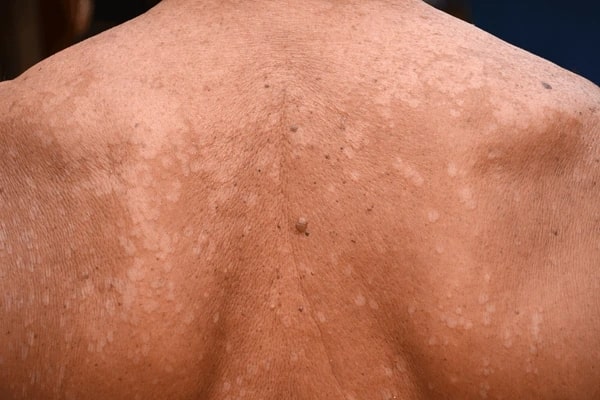Tinea Versicolor: Causes, Symptoms, & Treatment
Tinea Versicolor is a common skin condition that affects many people, causing noticeable changes in skin color. Understanding Tinea Versicolor, its causes, symptoms, and treatment options are essential for managing and effectively addressing this condition.
Dr. Sweta V Nakhawa, renowned as the best Dermatologist in Thane, specializes in treating various skin conditions, including Tinea Versicolor.
In this blog, we will explore everything you need to know about Tinea Versicolor.

What is Tinea Versicolor?
Tinea Versicolor is a fungal skin infection that leads to discoloration of the skin. This condition, also known as Pityriasis Versicolor, is caused by an overgrowth of the Malassezia fungus, which is naturally present on the skin.
The primary difference between Pityriasis Versicolor and Tinea Versicolor is that the former is often used interchangeably with the latter but can sometimes refer to a broader range of similar skin conditions.
Tinea Versicolor Causes
Fungal Overgrowth as the Primary Cause
The primary cause of Tinea Versicolor is the overgrowth of the Malassezia fungus. This fungus, which thrives in oily environments, can multiply and disrupt the normal pigmentation of the skin, leading to discolored patches.
These patches can appear white, pink, red, or brown, depending on the individual’s skin tone and the severity of the infection.
Contributing Factors
Several factors can contribute to the development of Tinea Versicolor, including:
- Hot and Humid Climates: These conditions can promote fungal growth, making Tinea Versicolor more common in warmer regions.
- Excessive Sweating: Increased perspiration creates a conducive environment for fungal overgrowth.
- Oily Skin: The Malassezia fungus thrives on oily skin, increasing the likelihood of Tinea Versicolor.
- Weakened Immune System: Individuals with a compromised immune system are more susceptible to fungal infections.
- Hormonal Changes: Hormonal fluctuations can also contribute to the development of this condition.
Symptoms of Tinea Versicolor
Visible Signs on the Skin
The most prominent symptom of Tinea Versicolor is the appearance of discolored patches on the skin. These patches can vary in color, including white, pink, red, or brown, and are often more noticeable during the summer when the surrounding skin tans.
The patches typically appear on the back, chest, shoulders, and neck.
Additional Symptoms
- Mild Itching: Some individuals may experience mild itching in the affected areas, although this is not always present.
- Dryness or Flaking: The skin in the affected areas may appear dry or flaky.
- Non-Contagious Nature: Tinea Versicolor is not contagious, so it cannot be spread through physical contact.
Diagnosis of Tinea Versicolor
Clinical Examination
To diagnose Tinea Versicolor, a dermatologist like Dr. Sweta V Nakhawa will perform a clinical examination of the skin. The appearance of the discolored patches is usually sufficient for diagnosis. Additionally, a Wood’s lamp may be used to highlight the affected areas and confirm the presence of the fungus.
Laboratory Tests
In some cases, laboratory tests may be conducted to confirm the diagnosis. This includes a skin scraping and microscopic examination to identify the Malassezia fungus and differentiate Tinea Versicolor from other skin conditions.
Tinea Versicolor Treatment
Topical Treatments
Treatment for Tinea Versicolor often begins with topical antifungal treatments. These include:
- Antifungal Creams and Lotions: Products containing clotrimazole or miconazole can help eliminate the fungus.
- Antifungal Shampoos: Shampoos containing selenium sulfide can be effective when used on the affected areas.
Oral Medications
For more severe cases or when topical treatments are ineffective, oral antifungal medications may be prescribed. These medications, such as itraconazole or fluconazole, help to eradicate the fungus from within the body. It is essential to follow the dermatologist’s instructions and be aware of potential side effects.
Home Care and Prevention
- Regular Washing: Use antifungal soap to wash the affected areas regularly.
- Keep the Skin Dry: Avoid excessive sweating and keep the skin dry to prevent further fungal growth.
- Prophylactic Treatments: In humid weather, using antifungal treatments as a preventive measure can help reduce the risk of recurrence.
Recovery and Follow-Up
What to Expect During Recovery
The discolored patches from Tinea Versicolor gradually fade over time with appropriate treatment. However, it may take several weeks or even months for the skin to return to its normal color.
Sun exposure can affect the appearance of these patches, so sun protection is crucial during recovery.
Importance of Follow-Up
Regular follow-ups with Dr. Sweta V Nakhawa are essential to monitor the condition and prevent recurrence. Dr. Nakhawa will provide personalized advice and treatment adjustments as needed to ensure effective management of Tinea Versicolor.
Why Choose Dr. Sweta V Nakhawa for Tinea Versicolor Treatment in Thane?
Expertise and Experience
Dr. Sweta V Nakhawa is a leading dermatologist in Thane with extensive experience in treating various skin conditions, including Tinea Versicolor. Her expertise ensures accurate diagnosis and effective treatment tailored to each patient’s needs.
Comprehensive Care
Dr. Nakhawa offers comprehensive care, from initial diagnosis to long-term management. Her approach includes personalized treatment plans and preventive strategies to manage Tinea Versicolor effectively.
Patient Testimonials
Many patients have successfully treated Tinea Versicolor under Dr. Nakhawa’s care. Positive feedback highlights her commitment to providing exceptional dermatological care and achieving excellent outcomes for her patients.
Conclusion
Understanding Tinea Versicolor, its causes, symptoms, and treatment options are crucial for managing this common skin condition. If you suspect you have Tinea Versicolor or need expert care, consult Dr. Sweta V Nakhawa, the best dermatologist in Thane. Her expertise and personalized approach will help you achieve healthy, clear skin.
Schedule an appointment today to address any skin concerns and receive top-notch treatment.
